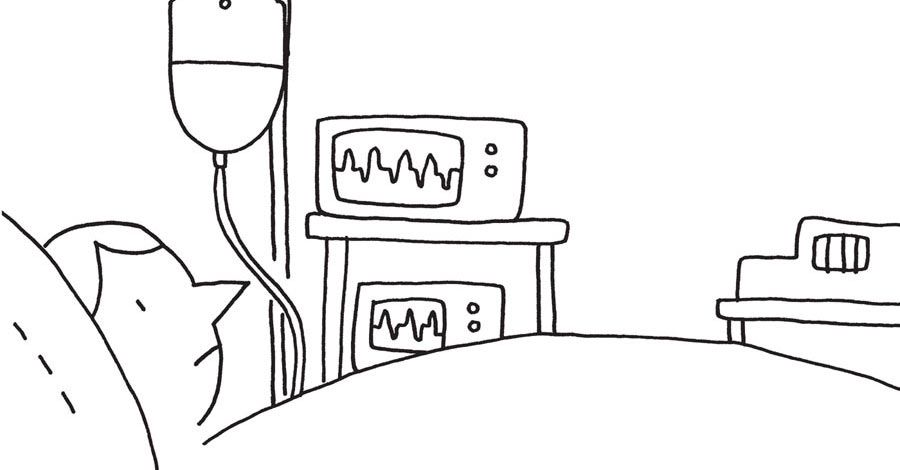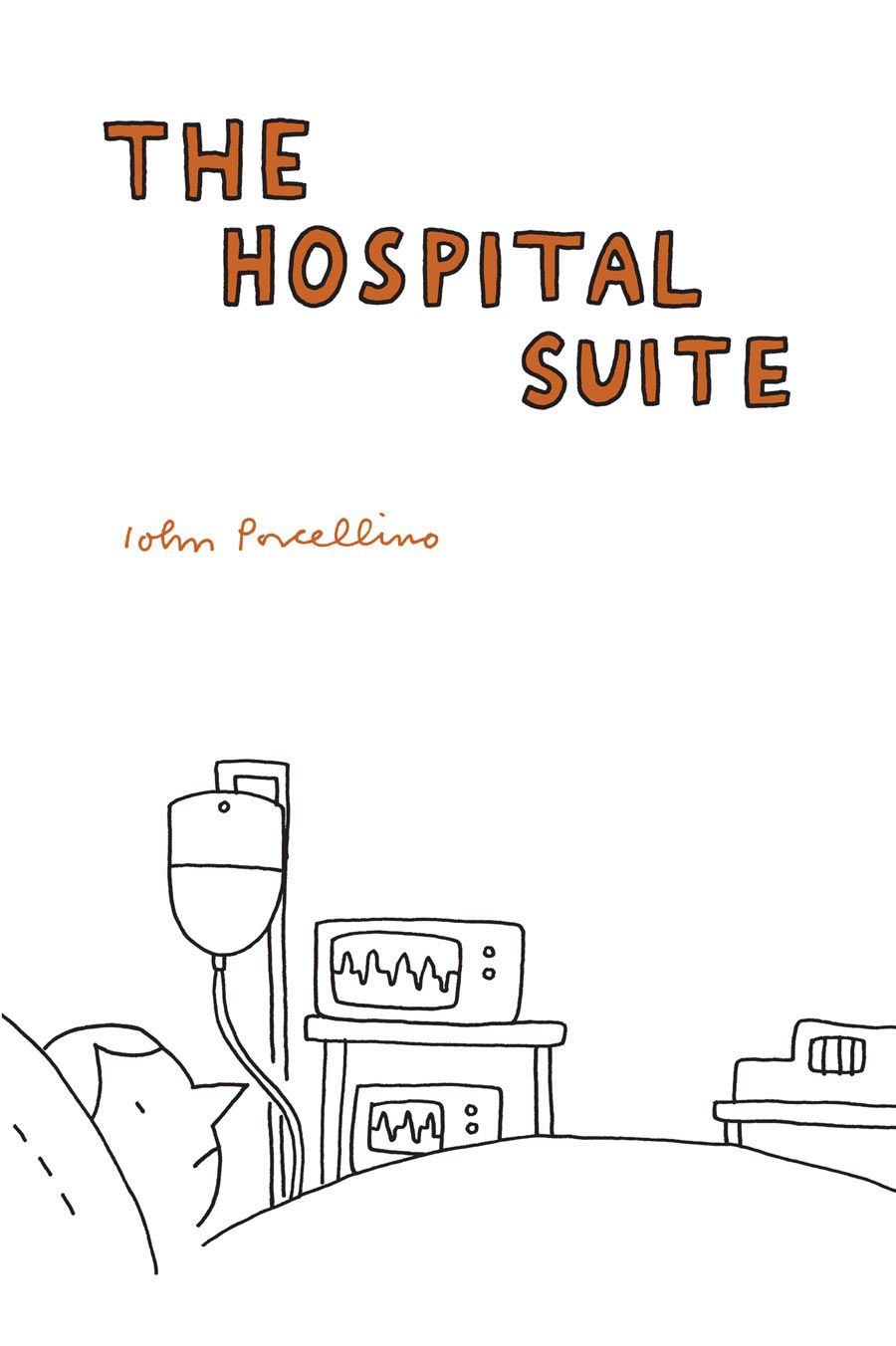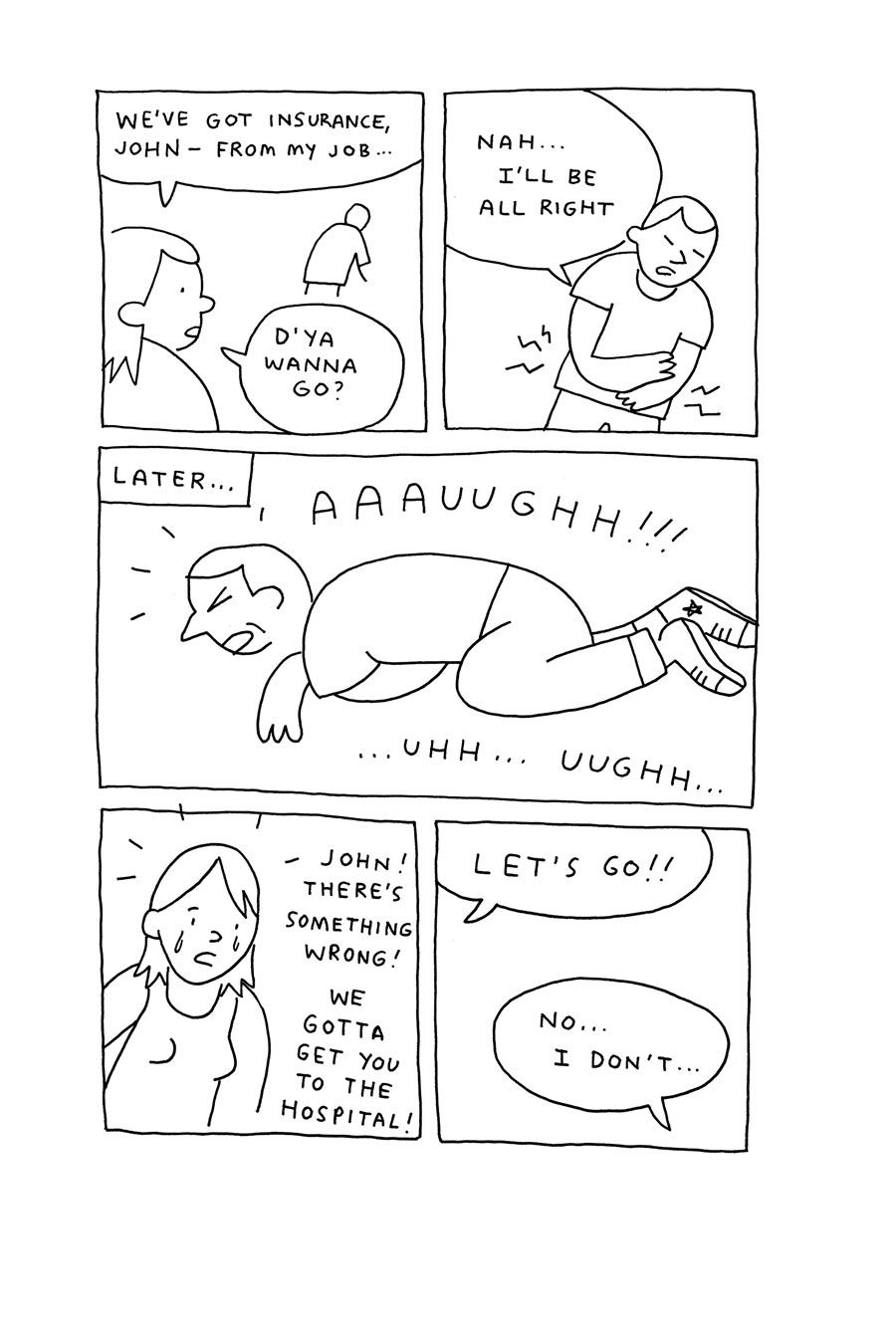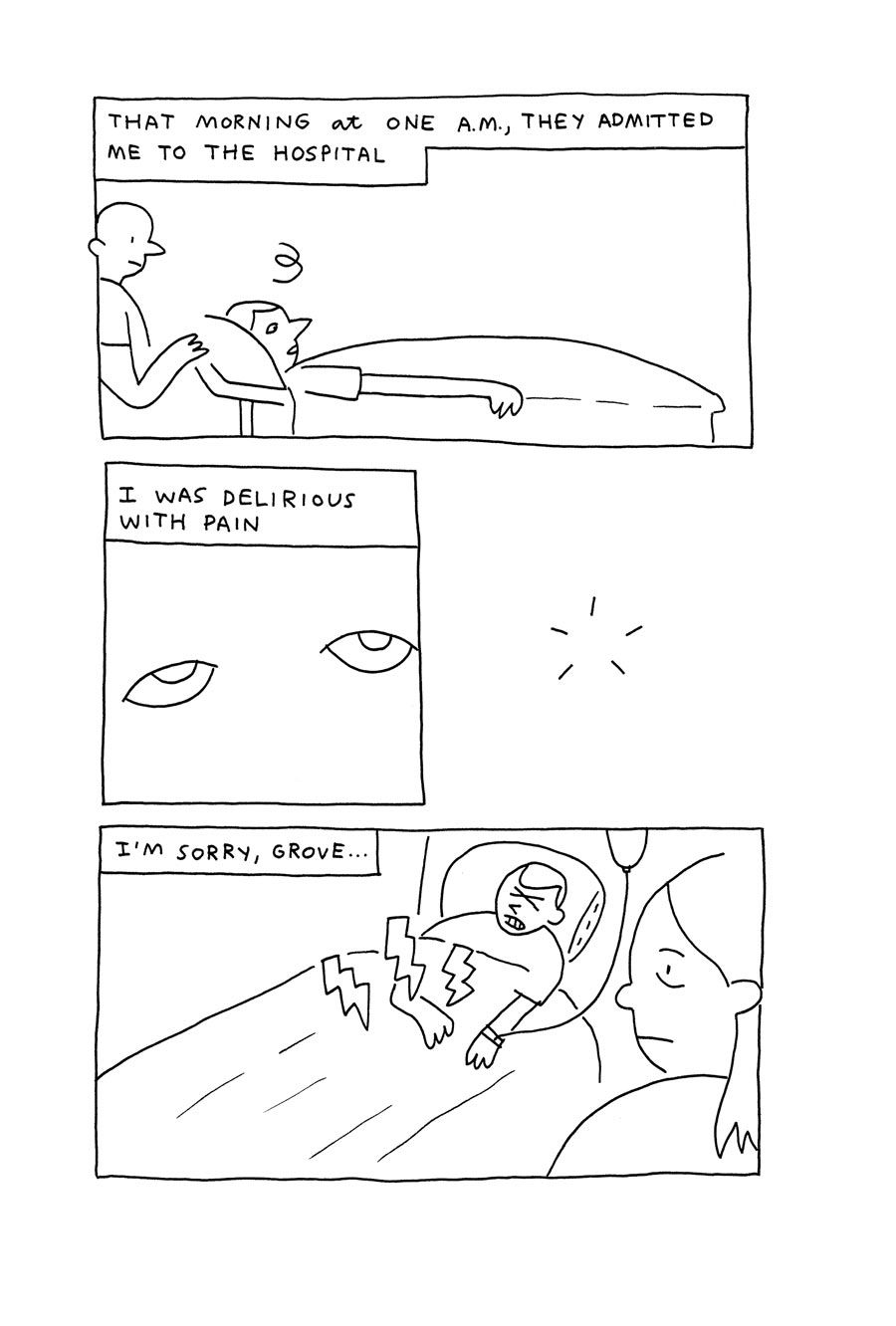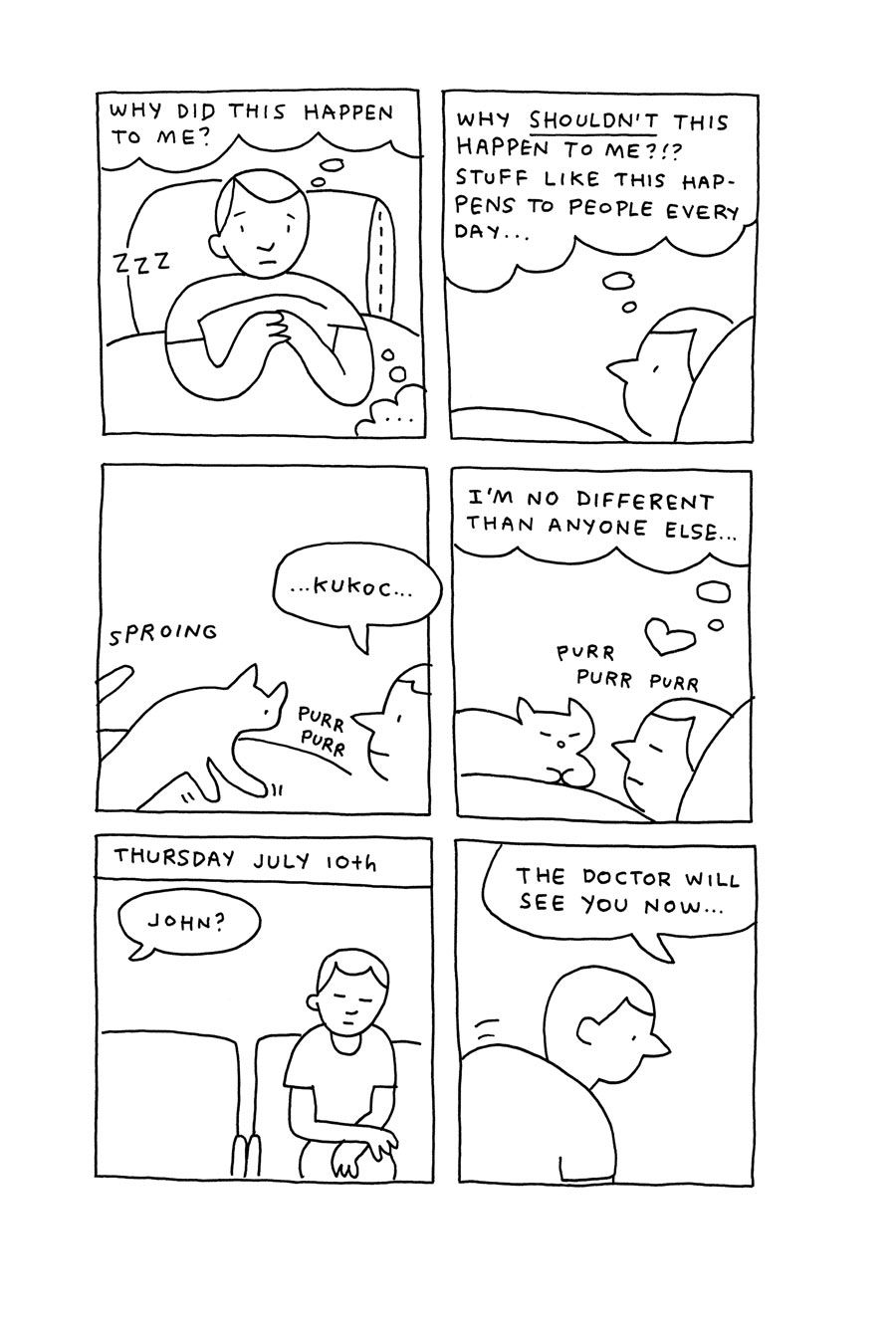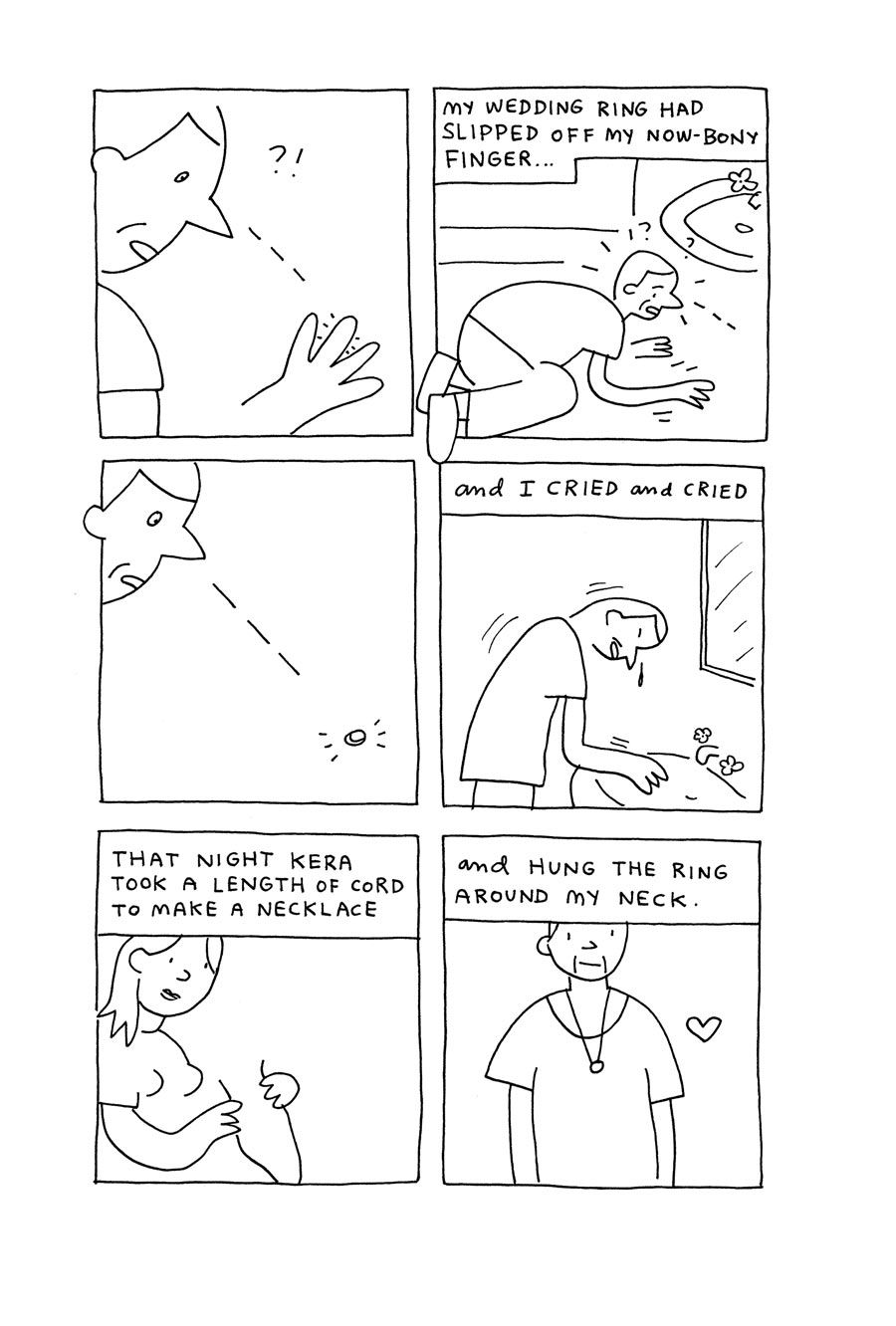Over the past twenty five years, John Porcellino has created and released 74 issues of his zine, "King-Cat Comix and Stories," with Drawn and Quarterly publishing two collections: "King-Cat Classix" and "Map of my Heart." Porcellino is also known for a number of other books, ranging from the autobiographical "Perfect Example" and "Diary of a Mosquito Abatement Man," to the acclaimed biography "Thoreau at Walden," to "The Next Day," which found him illustrating the true stories of survivors of suicide attempts.
His latest book, out now from Drawn and Quarterly, is "The Hospital Suite." It consists of three autobiographical stories that address Porcellino's personal health struggles, including an extended stay in the hospital, a tumor and OCD. Together, they create a powerful, moving story and represent Porcellino's best work to date.
CBR News spoke about the book with Porcellino, who is currently on a long tour that started at the Small Press Expo and continues through November, taking him across the country where, in addition to talking about his new book, he's often screening "Root Hog or Die," a new documentary film about his life and work.
CBR News: When did you decide that you wanted to write about these incidents?
John Porcellino: The first story, "The Hospital Suite," happened over the summer of '97. When I was in the midst of it, I wasn't thinking about turning it into a comic, necessarily. When I got out of the hospital and realized, I guess I'm going to live, I immediately sat down and pulled out a notebook and wrote out the details of what happened. I made a calendar -- this is the day I got sick, this is the day I had the colonoscopy, this is the day I got out of the hospital the first time, and so forth. I knew that eventually I was probably going to grapple with this in comics form so I started writing down as much as I could as soon as possible to save my memories. It was one of those projects that I pulled out every couple years and worked on it a little bit more. I knew that I wanted to write about it for a long, long time and that story in particular had a very long gestation.
I think I started working on the second story, "1998," when I was in San Francisco -- so, I think, 2003. It took a while to figure out. I worked on them every couple years for a month or two. I'd get a little bit farther along in the process and get a better sense of how to tell the story. It is a long time in the making. Originally, I envisioned three novellas, 100 or 90 page stories, and thought I would release them individually. When I actually sat down and started working on them in earnest I realized that first of all they work together to tell this larger story and also I didn't want to end up being the guy who every eighteen months or two years put out another book about the miserable stuff that happened to him. [Laughs] I figured I'd get it all out of my system and I wouldn't subject the readers to a long, agonizing story told over many years. That's how I started to envision it as a complete book.
Why do you think it took you so long to write about it?
Some of these longer stories take a while for me. I don't always know where they're going, or how I'm going to tell them. Certainly, the OCD story -- I felt when I was in the midst of all that OCD, there was just no way I was going to be able to tell that story. If you read the book, you see how it affected my creative ability. Everything I produced during that time period was like pulling teeth. It was just absolutely agonizing. The idea of actually writing about this crippling ailment -- that was preventing me from being creative -- was just too much. There were oblique references to what was going on in the comics that I was doing at that time, which were published in "Map of my Heart." I've dealt with anxiety and depression since I was a teenager, and for whatever reason, it was always easier to talk about the depression. I don't know why. I think maybe, as hard as it is for people to talk about depression, there's a precedent for talking about it in writing and art. OCD was just an absolutely different level of suffering for me. I was ashamed that I had this problem. I was utterly embarrassed. I spent so much time and energy trying to hide it from the people around me. A couple of really close friends knew about it, my family knew about it, eventually some of my co-workers knew about it, but mostly I tried to keep it hidden.
When I was doing the tour for "Map of my Heart" and I was talking about those years and the comics I was making, that's about the time I started being more open about the fact that I had obsessive compulsive disorder. As soon as I started talking about it, I realized that keeping it hidden only gave it strength. As soon as I started talking openly about it, a lot of the power that it held over me was diminished. On that tour when I would talk about my experience, almost invariably at each event, someone would come up to me afterwards and say, "I'm really glad you talked about that, I was really glad to hear it." Either they were struggling with it, or someone they knew or someone in their family was. It was eerie how people would come up afterwards. I realized it's more prevalent than you think, because it is such a hidden thing that people don't like to talk about. I realized that this would be something that might be a benefit to other people, and not just myself, to finally come out and tell the honest truth in all the nitty gritty detail of what it was like. It's been therapeutic, but also everyone dealing with this feels really alone. It's corny but the simple fact of hearing about other people's experiences and being able to relate to them is, I think, really important. It took me a while where I felt like mentally I was stable enough to tackle that story and also have a little bit of distance where I could see where the story was going and find a way to turn it into something that had an arc and some kind of conclusion. I didn't want to end the book with, OCD really sucks, it destroyed my life and I want to kill myself. [Laughs]
Luckily I was able to work out some treatment and a combination of different things that have let me be pretty stable. I feel like I'm probably going to have OCD for the rest of my life, to some degree or another, but it doesn't have that killer grip on me that it once had. That's also partially why it took so long; I had to wait for this thing to let go of me a little bit so I could talk about it and be truthful about it.
When I read that story, I remember thinking that you had gone back and looked at what other people thought happened and this was you saying, "This is what really happened and what it felt like."
Yeah. The way I was dealing with that stuff in my art was so oblique that unless you knew me personally it was probably going past people. There's a story at the end of "Map of my Heart" where I'm just standing on the front lawn watching this bird and it cuts to me sitting at my drawing table and the text is "lately I've been struggling." As soon as I wrote those words, I thought, that was the truest thing I've said in "King-Cat" in a long time. Not that I was lying about stuff. It was the sin of omission. I just couldn't bring myself to openly talk about this. That was the closest I got: "Lately I've been struggling." Just writing that line was such a relief to me. Just to acknowledge it in some kind of public forum -- even if there were no details or anything explicit about it -- this thing is wrecking me, and it's making everything so hard. I was making up for lost time, all those years of not being able to tell what was going on. Here was my chance to let people know all the horrific details.
We spoke years ago, when "Map of my Heart" came out, and you mentioned "The Hospital Suite." You made the comment that, looking back, your life was pre-illness and post-illness. I was curious about that idea, because so many of your short comics are about these moments where there's no narrative and they don't end neatly. That's very different from what you did here in this book.
Yes, and going through it, I knew I need to deal with this in my comics -- because that's how I deal with everything in my life, with my comics. I don't know where it's going. [Laughs] I don't know how this story is going to end. In this case, it's exactly what you said. I felt like, with something this big -- that's this important to me -- that I want to be able to have some kind of positive impact. It's not like I was waiting for a happy ending. I was hoping for a happy ending, for sure, but I was waiting for some kind of resolution that felt like there was some kind of ending point. Obviously, my life goes on, and I have good days and bad days, but I felt like I finally came to a point that it's time to tell this story.
You've told longer stories in the past, but was it a big challenge telling these stories?
Sure. Writing a longer story, I don't compare them, like one is more difficult than the other. I've spent ten years working on a one-page story, too, so it's not like it's harder or more time-consuming necessarily to do a longer story but it is a different thing. With any of my comics my hope was always to just let them be what they want to be. Some things need to be a one page comic with ten words. Some things need to be a 100-page comic that's dense with text and expository stuff. It's a matter of figuring out what the story needs, and then learning to provide that, hopefully effectively.
Were the people at Drawn & Quarterly helpful to you in putting the book together?
They give you some editorial guidance and gave me all of these notes, but it was mostly, "This should have a comma here," or, "You spelled this word wrong." They caught some mistakes that I meant to fix that, working on a long book like this, I lost track of at some point. One of the things that they're famous for is being pretty hands-off with their artists, creatively. They've always told me, "If we want to work with you, it's because we like what you do as an artist, and we trust you to do your work. You do your work and we want to help support your work." Most of the work I've done with them has been reprints of stuff from "King-Cat," and that material's already vetted, so this was a little bit different. They definitely made the book stronger, because there were sections where I'd made little mistakes, or there were oversights. Nothing in terms of, "You can't tell it this way." They're not that kind of publisher. They're pretty accepting of their artists' quirks.
Besides the new book, there's a new documentary about you, "Root Hog or Die," which is just out. How did this end up happening?
I was living in Denver and these two guys, Luke Janes and Dan Stafford opened up a used bookstore called Kilgore Books, with a focus on alternative comics. There's a couple good comics shops in town, but their idea was to focus pretty exclusively on alternative comics and art comics and the harder to find titles. It quickly became a hub of that scene in Denver and they've always been really supportive. Those guys have been publishing "Blammo" by Noah Van Sciver, Joseph Remnant and some other great artists. Dan was always a frustrated filmmaker and he'd always wanted to make a movie. I think it was Noah's idea. He said, make a movie about "King Cat."
We talked about it, and he started doing it. We shot some stuff in Denver and then he joined me on a month long tour and filmed the whole darn thing. He did a bunch of interviews. He got in touch with different friends and other artists and talked to them and put it together. It was one guy, one camera, one microphone, and a laptop. It doesn't get anymore barebones than that. I like that about it. If you're going to make a movie about "King-Cat," that's the way to do it. We're all pretty pleased with the way it came out. It was a lot of work, but I think he did a great job.
What's next for you?
When I get back from tour, my focus is going to be on getting #75 done. I want to get it out during the 25th Anniversary year. Middle of May is when "King-Cat" #1 originally was published, and that lines up with TCAF, so I'm shooting to have #75 out for TCAF next year. I have a good number of these longer stories that I've worked on, off and on, for a long time now. I've talked to D&Q about alternating collections of "King-Cat" with some new work like "The Hospital Suite." Some of them might be just 90-100 page books, but I think that's what we're going to try to do. I've got a number of those longer stories; I'm not sure what one will end up being the next book. I have enough stuff from "King-Cat" under my belt to do another two collections. I have a story about my old band, Smile, that I want to do. I have a book called "Exploring" that I want to do, about my pre-adolescent tween years. I want to do a comics biography of the Japanese poet Issa. I have a lot of projects that that have been percolating for a while. My main thing is, I'm going to get #75 out, and then the next thing will probably be a collection of out of print "King-Cat" stuff.
Are you interested in telling more longer stories going forward?
Well, the longer ones take longer. Like I said; I've got four or five things that are half-cooked that I think would be appropriate for a standalone book. "Exploring" is probably three stories as well, and one of them is drawn. There's stuff that's sitting around in my notebooks that I'm happy to do. I love "King-Cat." I'm going to do "King-Cat" until I die, but I love books, too. I've been a book fanatic since I was in kindergarten. It's a real thrill to open up the front door and there's a box of books with my name on it. I'm happy to have the opportunity to keep working on both of them.

